
Del Ray’s Jesse O’Connell has thrown his hat into the City Council race.
O’Connell launched a campaign website this morning and announced his intention to run in an email.
“I have been really lucky to work across a wide variety of city departments and issues,” O’Connell told ALXnow. “I think I have really good perspective on how all these things fit together. Fundamentally, I’m somebody that likes to solve problems. I think I’m really good at listening to people and sort of building consensus. I’m a collaborator, and I hope to bring that to Council.”
The married father of two is chief advancement officer at the American Council on Education, and has served for more than a decade on a number of city boards and commissions, including as chair of the city’s influential Budget and Fiscal Affairs Advisory Committee. He sees himself as a collaborator, a “servant leader” who believes that the city’s Zoning for Housing policies don’t go far enough in expanding affordable housing opportunities. He also says he’s excited about the potential for a good deal with the controversial $2 billion Potomac Yard arena.
“I think a good deal looks like the opportunity to fundamentally change the city’s revenue projections,” O’Connell said. “We’ve made investments in our public safety workers, we are working on stormwater infrastructure, we are spending a lot of money on stuff that we have to spend money on, and a lot of that revenue burden is borne by our taxpayers. I think the chance to get kind of a transformative commercial-oriented source of revenue is a really exciting one for the city.”
O’Connell is a New Jersey native and moved to the area to attend Georgetown University, where he earned a bachelor’s degree in sociology and a master’s degree in social and public policy. He is also a former All-American track star, who placed fifth in the U.S. Olympic trials in 2004 in the 800 meters. He and his wife moved to Alexandria in 2012.
“The whole time we’ve lived here, I have looked for ways to give back and to contribute,” he said.
Since last August, he’s also co-authored an Alexandria-focused blog, ALXtra. It’s a satire blog, O’Connell says, humorously intended for millennials.
“I think the newsletter is very informed by kind of a millennial sensibility,” he said. “I think it’s very informed by kind of a literacy with internet culture.”
On Zoning for Housing, O’Connell said that the city’s elimination of single family zoning is a good start.
“I think where the city landed at the end of this first phase was the right place to be,” O’Connell said. “People want to live here because it’s a great place to live. If we don’t have the housing supply to meet that demand, prices are going to go up. I’ve been really encouraged to see the city think more holistically more creatively about giving this broader set of tools to meet that housing demand.”
O’Connell is also a running buddy with Mayor Justin Wilson, who is not running for reelection. He also said that the next mayor will have to be a collaborator.
“I think we’re losing somebody that is tireless and dedicated,” O’Connell said of Wilson. “I genuinely can’t think of a better example of constituent service. He’s responding to people and interacting with people at all hours of the day and night. It’s clear that he deeply cares about Alexandria and wants to ensure that Alexandria is able to be the city for a whole sort of wide set of people.”
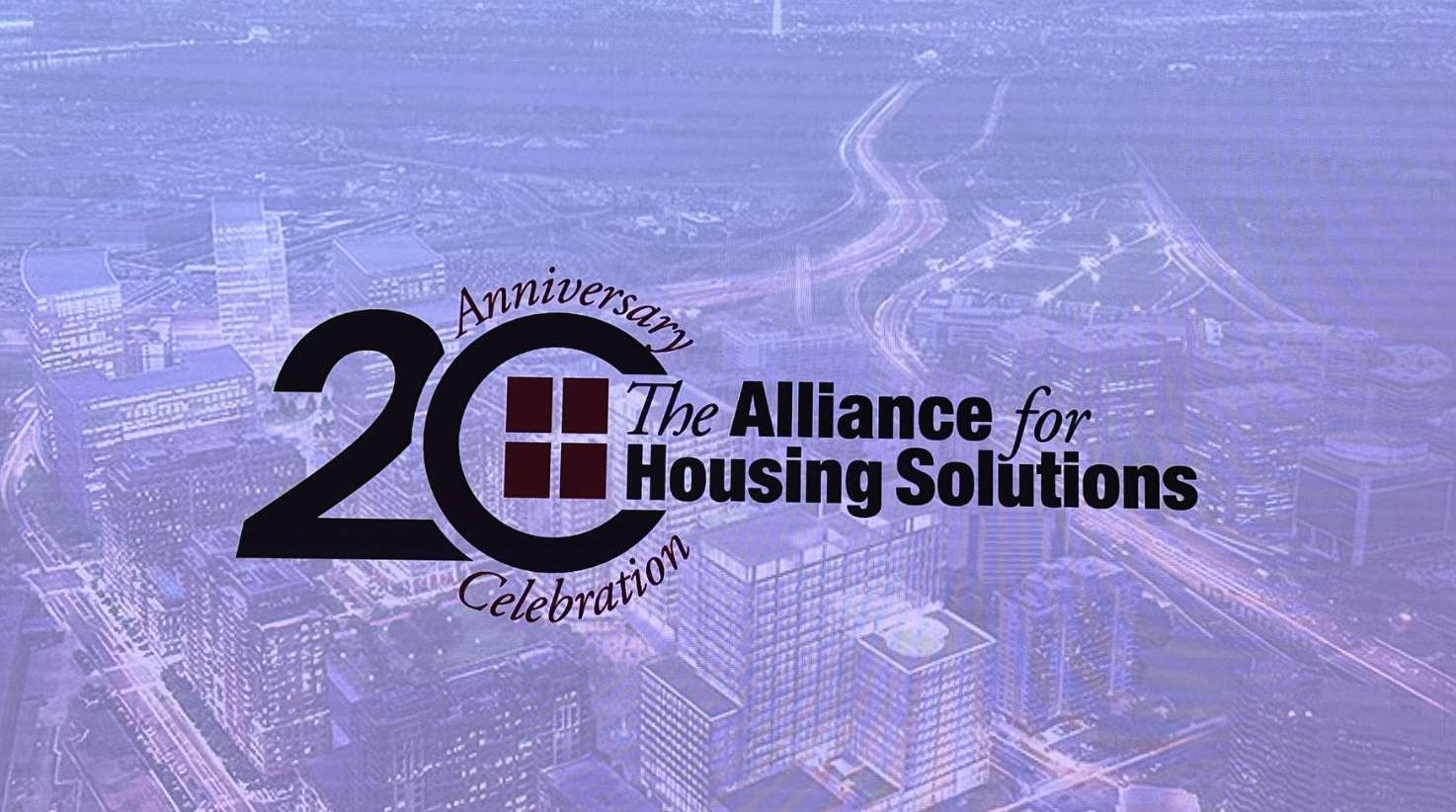
Two longtime affordable housing advocacy nonprofits have announced that, as of Jan. 1, the groups have officially merged.
The Northern Virginia Affordable Housing Alliance (NVAHA) and the Alliance for Housing Solutions (AHS) announced in a release that they’d be consolidating into one organization.
“The decision to unite is rooted from a shared commitment to better serve the community by leveraging collective knowledge, resources and advocacy strengths,” Jill Norcross, who will near the consolidated group as executive director, said in the release. “This will build on our complementary assets and vision to create a more effective and sustainable affordable housing movement in each jurisdiction throughout Northern Virginia.”
Both groups worked in housing advocacy rather than directly building or managing affordable housing programs.
AHS has worked primarily in Arlington, advocating for the missing middle housing initiative. NVAHA’s website says the group has a wider Northern Virginia focus.
“We collaborate with nonprofit and for-profit organizations, and government agencies engaged in housing and community development in Northern Virginia, across the greater Washington metro area, statewide and at the national-level,” the website said.
A release from the unified organization said one of the goals of the merger is to move toward focusing on regional affordable housing strategies.
A representative of the new organization said a new name is still being deliberated.
Image via Alliance for Housing Solutions/Facebook

(Updated 3:15 p.m.) As temperatures drop below freezing, the Alexandria Redevelopment and Housing Authority is warning its low-income families that they will be arrested if caught wearing ski masks.
In a Nov. 14 notification to approximately 1,500 low-income households under its watch, ARHA said that the Alexandria Police Department notified them that they will start “enforcing the prohibition against wearing face coverings that hide an individual’s face now that the COVID pandemic is over.”
The notice continued, “This means that anyone over the age of 16 who is caught wearing a ski mask in public will be arrested per section 18.2-422 of the Code of Virginia. Please share this information with your children and other household members.”
Violation of that code section is a Class 6 felony, punishable by up to a year in prison and/or a $2,500 fine.
Alexandria’s gun-related crime rose this year, with many incidents occurring on ARHA properties in Old Town North.
APD communications manager Tracy Walker said a sergeant recently visited residents and “provided information for parents who may consider educating their family members, that wearing ski masks and not medical masks violates the state code anywhere in the Commonwealth.”
Walker said the law allows for an officer arresting or detaining someone during the investigation of larceny or robbery to consider the ski mask as probable cause to be associated with the criminal behavior they are investigating. She also said that there has been no guidance to officers to change or enforce this violation differently.
Face coverings were required by law in Virginia from May 2020 to May 2021 during the worst of the COVID-19 pandemic.
Kevin Harris, president of the ARHA Residents Association, said he’s looking into the message. He also said that he is not aware of police talking to residents, only to ARHA staff.
“I saw the notice and I’m looking into it to get clarity on its intention and the law itself since it can be interpreted so many ways and carries an implication of potential discriminatory actions against ARHA residents and repercussions for all citizens of Alexandria,” Harris told ALXnow. “It’s cold outside and plenty of people will be wearing face masks while they head home, jog, or walk their dogs. Our jails could be full this winter if this law is exactly like it’s stated in this notice. I’m hoping that’s not the case so I’m doing my research.”
ALXnow reached out to ARHA for more information on the notification.
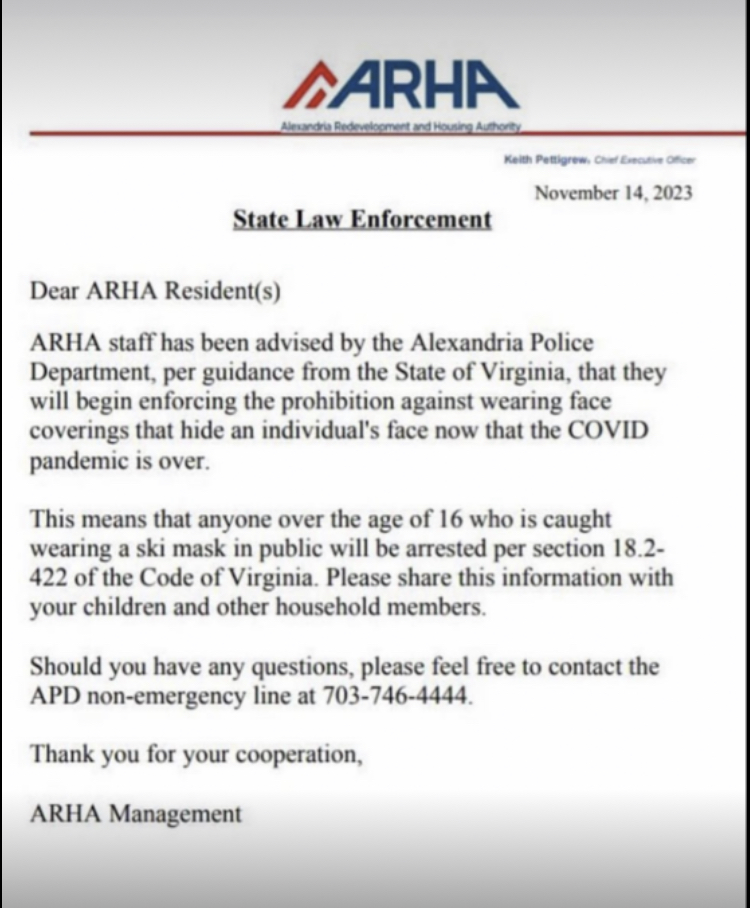
Single-family-only zoning is no more in Alexandria.
Alexandria’s City Council voted unanimously at around 1 a.m. on Wednesday, Nov. 29, to approve the Zoning for Housing/Housing for All initiative.
The plan includes zoning changes that aim to encourage the development of more housing units. Notable changes include allowing residential uses in industrial zones and reducing parking requirements, but the big headline-getter and conversation-starter was the elimination of exclusively single-family housing zones.
The City Council vote came after three months of public discourse on the plans, including two lengthy public comment sessions that included calls for affordable housing for “deserving Blacks” and the spanking of public officials.
When the plan debuted at a City Council/Planning Commission meeting earlier this year, several city leaders expressed disappointment at the underwhelming change to single-family zoning. Notably, the zoning change doesn’t affect requirements like setbacks and density for those units.
But the single-family zoning change set off a significant public discourse, as a similar proposal did in Arlington nearly a year ago.
Opponents of the plan, including a group called The Coalition for a Livable Alexandria, said the change will create more density and negatively affect the quality of life for residents while doing very little to create affordable housing. One opponent described the plan to this reporter in an elevator on the way to the meeting as a “Trojan horse,” disguising a giveaway to developers as progressive policy.
But supporters of the policy proposals say adding new residential units around the city will help add much-needed residential units to the city’s stock of housing, eventually decreasing the demand that’s been at least partially responsible for driving up prices.
Vice Mayor Amy Jackson suggested splitting the single-family zoning section off from the rest of the initiative. Jackson said that many residents didn’t receive adequate warning from the city about the zoning change and said a mailer should have been sent out. But while some others on the City Council acknowledged criticism that a mailer should have been sent out to residents, the suggestion to defer the single-family zoning piece of the initiative didn’t gain traction with others on the Council.
Most of the City Council spoke firmly in favor of Zoning for Housing.
“The question we’re facing as a Council, and as a city, is whether we’re willing to commit the effort and resources to make Alexandria an inclusive city — one where low and middle-income families and seniors aren’t driven out by skyrocketing housing costs — or if we will continue down a path of exclusivity, where only those among us who have the most are able to remain,” said Council member Kirk McPike. “My values, driven by my own life experience and my faith, demand the former.”
“I don’t think of it as density for density’s sake,” said Council member Alyia Gaskins. “I’m proud and happy with where we’re ending tonight. I’m going to vote for this. I don’t think it’s doom and gloom, I think the research and the data are things we can manage and support.”
Council member Sarah Bagley said the Zoning for Housing initiative also ties in with some of the city’s climate change goals with an emphasis on transit-oriented development.
“The more we can embrace Alexandrians in ways our infrastructure can support, that we can infill, that we can create housing near transit,” Bagley said, “[the more we] build a better future for people who are going to live to see 2053 and 2073.”
The conversation on the dais was sometimes as much about some of the public debate around Zoning for Housing as it was about the initiative itself. The Alexandria Times reported conversations between advocates for Zoning for Housing and members of City Council, though Council members characterized those meetings as standard for any public discussion.
“I’ve been frustrated with the rhetoric and how this has been discussed in our community,” said Council member Canek Aguirre. “Nobody up here is having meetings with Satan or his disciples. We’ve been having meetings… with residents and groups that represent residents.”
Aguirre said he was approached for meetings by advocates for Zoning for Housing and would have met with opponents if they’d asked to meet.
“I’m disturbed by a local paper saying there are secret meetings: it’s called a constituent meeting,” Aguirre said. “I’ll meet with anyone that asks for a meeting. You know who didn’t ask me for a meeting? The Coalition for a Livable Alexandria.”
Some members of the Council had qualms about Zoning for Housing but still ultimately voted in favor of the initiative. Council member John Chapman said there are positive aspects of Zoning for Housing, though he had little faith in the market providing affordable housing without other incentives.
“I’ve seen the market destroy my generation,” Chapman said. “People are not able to stay here and live here. We’ve lost 90% of market rate affordability in the city over the last couple of decades. The market has not been kind to Alexandria’s middle and working class. The challenge is getting me to be excited about the little tiptoe step into the market when I know that what we’re trying to obtain in single-family homes isn’t attainable.”
While Jackson said she still believed the city should have postponed the vote, she said she supported the initiative.
“As much as I did want to defer the single-family housing part, for the rest of this, it shows that Alexandrians want progress,” Jackson said. “We want to be able to help people wherever we can.”
Mayor Justin Wilson said that Zoning for Housing won’t fix the city’s housing problems, but it’s a start.
“Never going to be able to spend enough dollars up here to really impact this, but our zoning authority is a powerful tool that gives us the ability to shape the supply,” Wilson said. “The [initiatives are] modest, but I believe they’re good.”
As city leaders started to turn their attention to a potential future Phase 2 of Zoning for Housing/Housing for All, which could see more ambitious reforms regarding density and allowances on the former single-family home parcels, Wilson said it was important to give the issue, along with the public and city leadership, a breather.
According to Wilson:
Let’s pause, take our breaths, let’s see how some of these changes are taken, and then let’s discuss whether and what we would possibly do next.
There are other things I want us to look at too that touch housing in other ways. Some of these things in Phase 2 recommendations that we heard from people who opposed this effort — like looking at neighborhood conservation districts to protect historic properties.
There are going to be possibly things here we’re going to want to have a conversation about, but I think everyone needs to take a breath and see what’s next here.
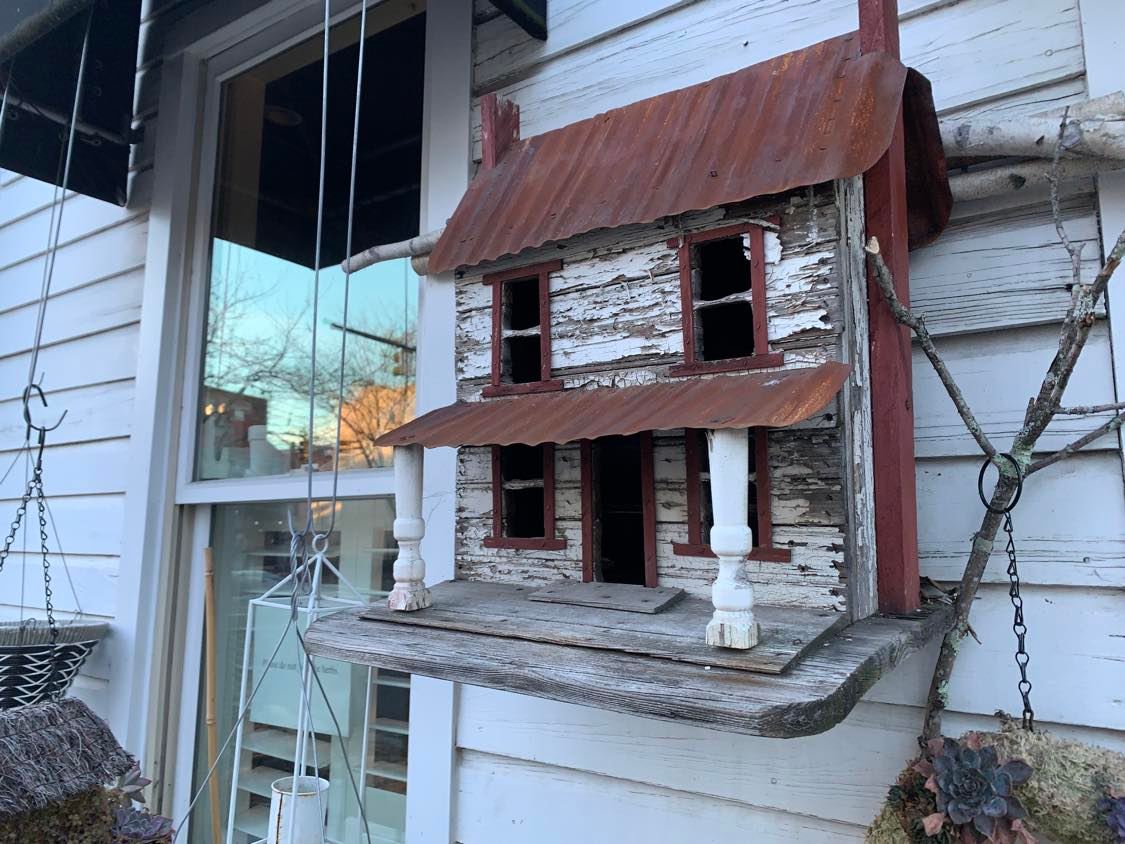
Few speakers at a six-hour City Council meeting last night seemed fully satisfied with the Zoning for Housing/Housing for All initiative, but the public comment was divided between those who saw the proposal as a good first step and those who thought it threatened the city’s character.
While nearly all speakers at a six-hour public hearing last night said they supported affordable housing, opinions on the city’s Zoning for Housing/Housing for All initiative varied widely.
Zoning for Housing/Housing for All is a proposed overhaul of the city’s zoning code that would, among its changes, allow the construction of multiple units on lots currently zoned for single-family homes.
The plan got a frosty reception at a joint Planning Commission/City Council meeting by city leaders who didn’t think it was ambitious enough, particularly because the proposal doesn’t touch setback requirements and similar issues, meaning new homes built on single-family lots are likely to be no larger than current ones.
Some of that concern was reflected in the public comment yesterday, though housing advocates said they still expressed support for the project as a start.
“I would also like to see the city enact further reforms to the zoning code to allow for even more housing to be built, [but] this is a good start,” said Rosemont resident Joe Fray. “I am excited for new neighbors to move in, for old neighbors to be able to stay, and for our city to grow in ways that will enhance current residents’ lives.”
Fray said he hopes the change starts creating more dense, walkable neighborhoods around the city.
Jonathan Krall, a steering committee member with Grassroots Alexandria and a Del Ray resident, said he supported these “small reforms,” particularly after learning more about the history of segregation in Alexandria.
Others said they believed past concerns about segregation in Alexandria residential neighborhoods don’t reflect the reality of the city today. Fran Vogel, President of the Strawberry Hill Civic Association, described her neighborhood as “multi-ethnic, multi-racial and multi-generational.”
“People move to our neighborhood because it provides green space as well as a place to raise a family,” Vogel said. “There is nothing exclusionary and anyone can buy here. One can buy a smaller home that can be expanded to accommodate a growing family; it’s a matter of choice.”
Vogel said she’s particularly concerned about reductions in parking requirements in Zoning for Housing/Housing for All, saying it could exacerbate parking overflow problems in Strawberry Hill and other neighborhoods.
“It’s conceivable a fourplex could have anywhere from zero to twelve cars depending on the number of residents,” Vogel said. “Bringing more people into our small area will only exacerbate this issue.”
Tack Richardson, a lifelong Alexandrian and President of the North Ridge Citizens Association, said he was concerned about the impact Zoning for Housing/Housing for All could have on Alexandria neighborhoods.
“We believe increasing density can adversely impact the quality of life in neighborhoods such as North Ridge,” Richardson said. “We hope the City of Alexandria will listen to… North Ridge and our fellow civic associations.” Read More
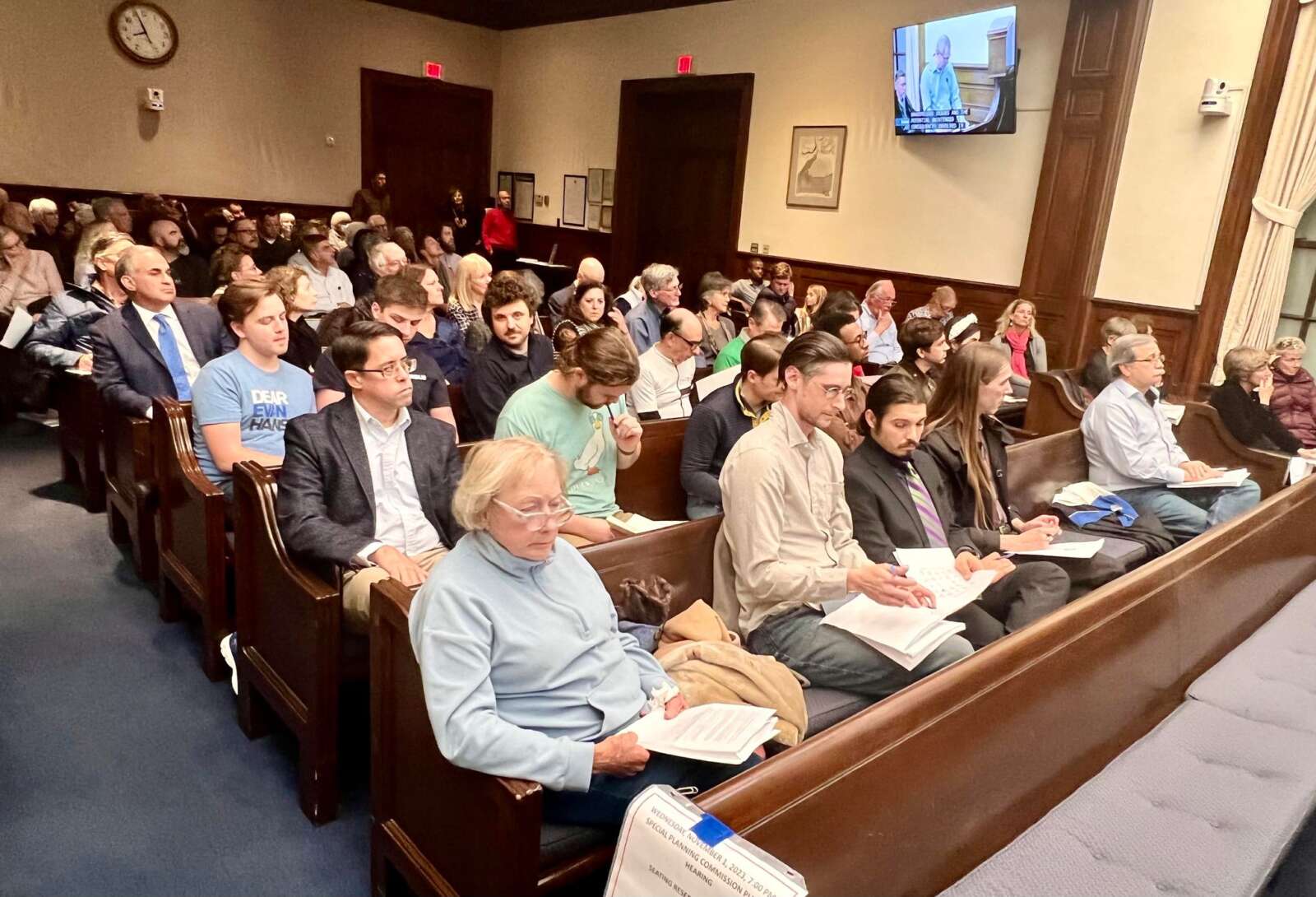
The Alexandria Planning Commission unanimously endorsed a sweeping overhaul of the city’s zoning ordinances on Wednesday night, giving City Council the green light to vote on it later this month.
There were more than 100 attendees and 51 speakers at the Planning Commission’s five hour public hearing, which ran after midnight. The speakers were a mixed bunch, with about half supporting the legislation and the other half opposing it.
The Zoning for Housing overhaul is intended to expand new affordable housing opportunities and would reshape a host of ordinances, including changes to single-family zoning, expansion of transit-oriented development, reducing parking requirements for single-family homes and analyzing office-to-residential conversions.
“I think we’re going to have to be nimble with this,” said Planning Commission Chair Nathan Macek. “I do think, though, we want to be careful with this particular market, and given the challenges that this distressed office space has already, we just have to be sensitive of the fact that we not douse the potential for the development because we’re trying to put too many constraints on it.”
City staff tabled one initiative — a bonus height amendment that incentivizes developers to add affordable housing to projects in exchange for two additional stories of construction in areas where height limits are 45 feet or more. Del Ray residents protested the move, with many saying that its approval would destroy the neighborhood.
“Staff’s recommendation is to table this proposal as several existing zoning provisions, that are not proposed to change under this package of reforms, would severely curtail this provision’s regulatory and financial viability,” according to a staff report.
Prior to the meeting, Mayor Justin Wilson said on social media that the city’s zoning laws are outdated. Wilson said that the proposed policies will desegregate the city, and that a number of zoning ordinances in the 20th century divided the city by race.
Alexandria is having a spirited conversation about laws that prohibit building anything but detached single-family homes.
8 NEW CONSTRUCTION detached, single-family homes have sold in 2023:
AVERAGE sale price: $2.17M
LOWEST sale price: $1.90M pic.twitter.com/2krQ1uXw5D
— Justin Wilson (@justindotnet) October 31, 2023
Alexandria’s affordable housing crisis
Alexandria is currently experiencing an affordable housing crisis, and lost 90% of its affordable housing stock between 2000 and 2017. The city has pledged to produce or develop thousands of units to meet 2030 regional housing goal set by the Metropolitan Washington Council of Governments.
According to the city:
According to U.S. Census figures, nearly twenty percent of Alexandria’s 80,000 households with incomes up to $75,000 are cost burdened. Approximately 19,000 households are paying more than the federal government indicates they should for housing, leaving little in their households budgets for necessities. The City projects that the number of households in Alexandria will rise to about 100,000 households by 2035. The longstanding imbalance between housing supply and demand, exacerbated by stagnating wage growth particularly in low to moderate-wage sectors, is a key factor underlying the high cost of housing, imperiling our ability to grow an economy that depends on a diversity of skillsets.
Alexandria middle school teacher David Paladin Fernandez said that many of his fellow teachers can’t afford to live in the city.
“I know multiple educators that live outside of Alexandria, some as far away as Fredericksburg,” he said. “They don’t live in these places because it’s convenient. They live in these places because that is where they can afford to live, meaning they will not be able to connect to the community in the same way a resident can. They will not have the benefit of the students and parents seeing them as fellow citizens of Alexandria, despite the fact that they’ve chosen to give their lives to serve the city.”
The city conducted dozens of public meetings for more than a year on the Zoning for Housing proposals, but only released a draft plan in September.
“The sessions have focused on general issues and goals, not specific proposals,” said North Ridge resident Sonny Yoder, who asked for a deferral. “Full disclosure came only 30 days ago.”
Luca Gattoni-Celli, founder of YIMBYs of Northern Virginia, said that the city can solve its affordable housing crisis and shouldn’t fear the solution. Gattoni-Celli lives in the West End, surrounded by thousands of city residents living in apartments, he said.
“Living near thousands of other human beings is nothing but a blessing for me and my family,” he said. “It’s wonderful.”
West End resident Kursten Phelps said that she got lucky eight years ago when she got a $5,000 raise and that she and her family were then able to afford to buy their home.
“We got very, very lucky,” Phelps said. “Many of our kids friends are being squeezed out of Alexandria because their rents are rising and there’s no available homes in their budget.”
Ian Smith, 24, has been living in an Alexandria duplex for the last three years, and said that young residents find it nearly impossible to afford to live in the city.
“Even though we get college degrees and work hard for our competitive jobs in the DMV area, basic aspirations like owning a home and starting our own families seem completely out of reach due to the cost of living,” Smith said. “We desperately need housing. This initiative is a great first step.”
Many city residents pleaded with the Planning Commission to defer the proposals, and said that the public has not had enough time to discuss the draft plans.
Roy Byrd, a 25-year city resident, is chair of The Coalition for a Livable Alexandria, a group founded this year largely in opposition of these rezoning issues. He said that there are several unknown variables that the public needs to understand.
“Will the median cost of a single-family home decline or increase by how much year-over-year over the next 10 years?” Byrd asked. “Will the proposed zoning changes result in an increase in revenue for the city, and if so, by how much during the 10 year period, and will it also result in lower property taxes and reduced fees for residents?”
City Council will conduct a public hearing on the Zoning for Housing package on Tuesday, Nov. 14, followed by a public hearing on Nov. 18 and a vote on Nov. 28.
More details on the draft initiative are below the jump.
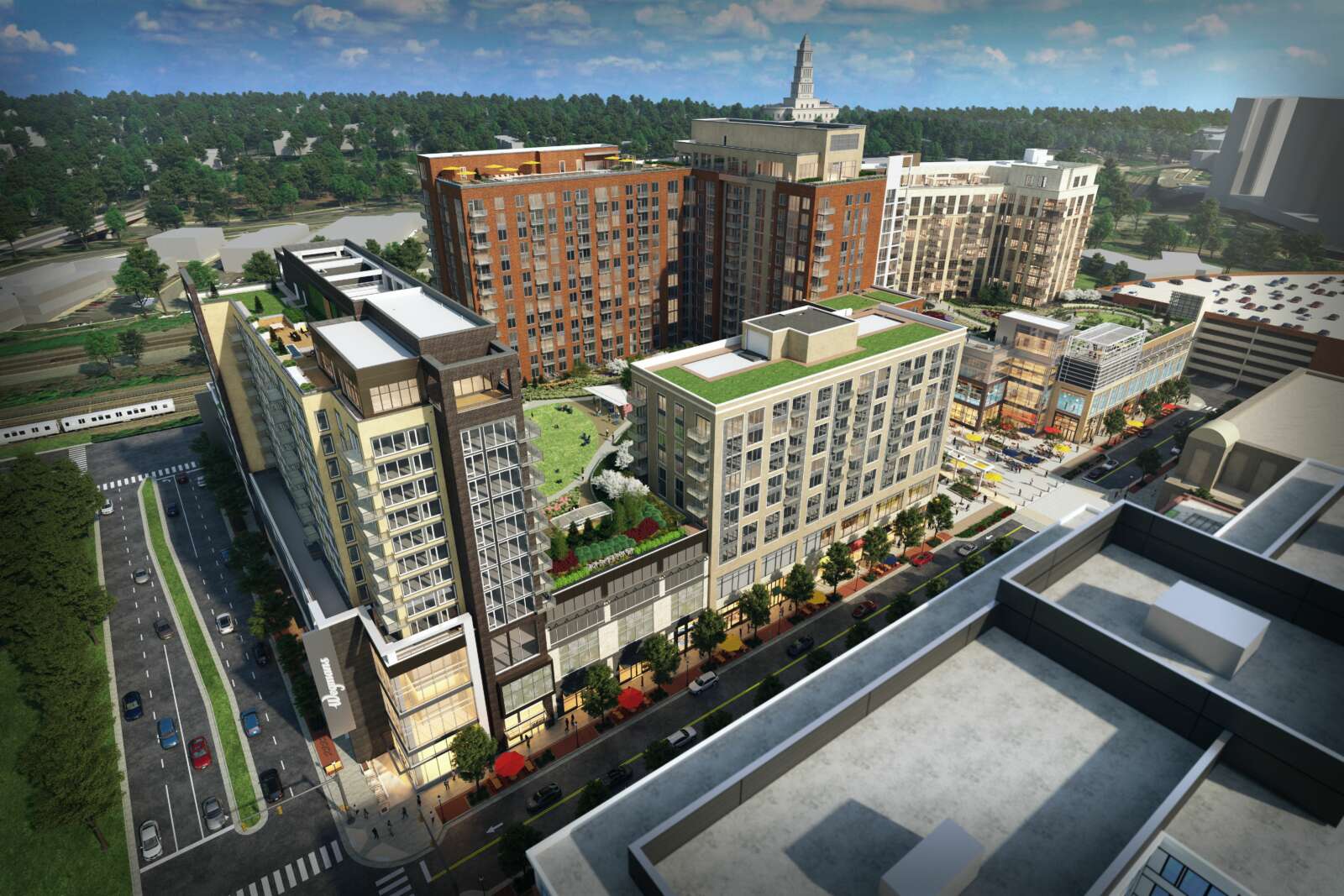
Alexandria renting units in Class A apartments — newer, high-rise buildings — have seen their rent increase by an average of 4.7% over the last year, real estate website UrbanTurf reported.
Those Class A units comprise the majority of new construction around the region and are generally developments built after 1991 and featuring amenities. The effective rent per month in one of those units in Alexandria, which includes a mix of studios, one and two-bedroom rentals, is $2,475 per month.
That increase is one of the sharpest increases in the region, behind only Upper Georgia Avenue (increased by 5.6%) and Bethesda (increased by 5.2%).
Rents for those types of units increased across most of the region, only decreasing slightly in NoMa and the Capitol Hill neighborhoods of D.C.
Rents for Class B units, generally mid/high-rise units, has also increased over the last years, rising by an average of 18% in the region. UrbanTurf reported last year that West Alexandria saw a 116.8% increase in Class B unit rents while Arlandria saw a 108.1% increase.
Anita Morrison, principal at Partnerships for Economic Solutions, said in a panel earlier this year that despite a surge in new residential units being built in Alexandria, rents have continued to climb.
“The fastest growing age category is people ages 65-74 and children under 20, but folks 20-24 dropped in Alexandria and 25-34 did not grow as much as the rest of the market,” Morrison said. “We think that’s a reflection of not being able to buy here.”
Morrison said the problem is that, even with the new housing units, Alexandria’s housing supply isn’t keeping pace with the demand.
“The scale of developments haven’t met the need,” Morrison said. “We’re always running a few steps behind the demand. It’s about getting enough supply to increase vacancy rates and create competition, but we’ve never moved the needle enough with supply to see that happen.”
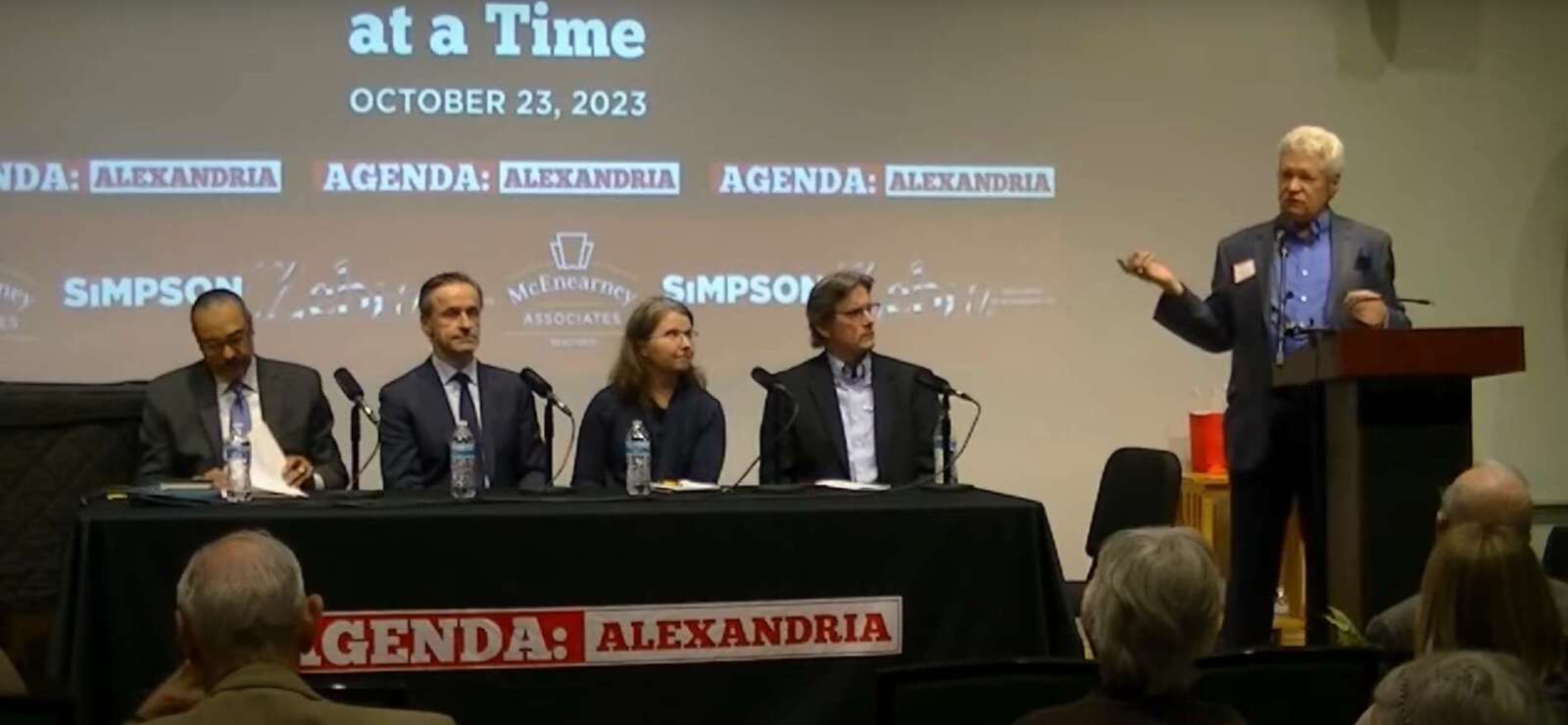
A panel last night on the city’s Zoning for Housing/Housing for All overhaul dived into the back and forth on the issue, including questions about the timeline from proposal to final review.
The proposal includes a number of changes to the city’s housing zoning, the most high-profile being allowing two-to-four-unit dwellings in formerly single-family residential zones. Other substantial changes include making it easier to build housing in industrial zones and eliminating minimum parking requirements for dwellings with up to four units in enhanced transit zones.
The discussion, hosted by Agenda: Alexandria, brought together:
- Roy Byrd, chair of The Coalition for a Livable Alexandria, which has been vocally critical of the planning process
- Susan Cunningham, a candidate for Arlington County Board who campaigned in opposition to a similar process in Arlington
- Stephen Koenig, a commissioner on Alexandria’s Planning Commission
- Karl Moritz, the planning director for the City of Alexandria
Beyond some of the main points within the specific Zoning for Housing/Housing for All plan, one of the criticisms has been that the planning process has been rushed. Depending on how you’d define the process as starting, the discussion of the zoning changes has been going on since either November 2022 or since 2018/2019, when the City of Alexandria met with other localities to discuss the regional lack of affordable housing.
“In 2018/2019 we first realized, after the 2008 recession, the region and the city had not been producing housing at the same pace as we had been before the recession,” Moritz said. “Each year, [we were] falling further and further behind in meeting the demand for housing. The consequences of not meeting that demand are legion.”
Moritz said in addition to harming those seeking affordable housing, Moritz said staying in a home that’s rapidly accelerating in value has consequences for the homeowner.
“We have a crisis we’re trying to address,” Moritz said. “We’re not just starting the discussion in March 2023; we started this discussion in 2019, and in many ways, we started this discussion a long time earlier.”
But the full Zoning for Housing/Housing for All recommendations weren’t revealed until early September, three months before final review before the City Council, scheduled for Nov. 28. Moritz said those months have been filled with in-depth, thoughtful and considered discussion.
Those three months have been a whirlwind of public discussions, and Koenig said in his view, a delay would cost more time and resources without much gain:
What I’ve observed over the years with Director Mortiz’ work: there’s a tremendous about of effort and responsibility to balance all those resources. So when you come down to something that sounds relatively simple like “why don’t you take another couple months” the questions in play here are: what would we be able to do that we have not already done, not to mention what is the cost of taking that additional time.
My personal take, for what it’s worth, is everything we need to know to make a thoughtful, responsible recommendation as Planning Commission to Council is in front of us now…
I personally don’t feel that another couple of public meetings is necessarily going to add anything to that.
Byrd, however, said there have been changes in the framing of the public discussion over those few months that show more discussion is needed to get the community on the same page. Byrd noted that much of the early conversations were about using Zoning for Housing to create more affordable housing, which has at times been emphasized in other discussions.
“We’re no longer having the conversation we started in July about how do we create affordable housing; that discussion has moved on and changed,” said Byrd. “The changes have been staggering… We’re concerned that this is really a giveaway to developers. We understand it will enhance revenue for the city, but we’re doing a lot here and we’re doing it fast and we don’t understand ‘why the rush?'”
Cunningham said, when Arlington went through a similar process, there was a similar “morphing” of the public discussion as that went on.
“In our conversation across a similar time period, it morphed across the time and not everyone followed the morphing,” said Cunningham. “I think that, for me, is a call to slow down, even though slowing down has costs, and making sure that everyone is having the same conversation is important. What happened in Arlington, from my perspective, was people were having different conversations [and] we weren’t having those conversations well.”
The full discussion was posted online by Agenda Alexandria.
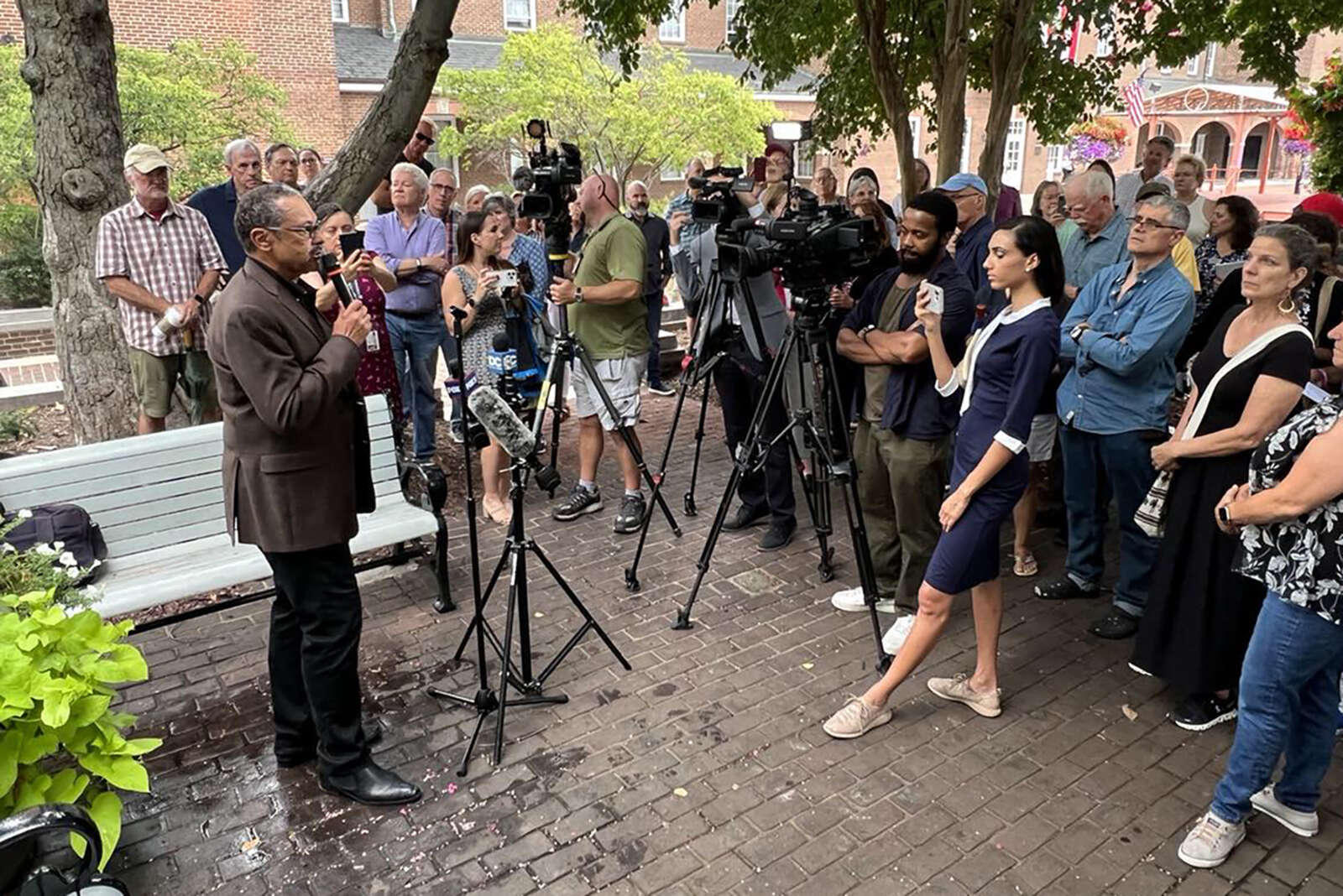
Discussion panel program Agenda: Alexandria is hosting a panel tonight to bring advocates and opponents of the city’s housing reform together for a showdown.
The chosen dueling ground will be the Lyceum (201 S. Washington Street) at 7 p.m., though onlookers can also view the panel online.
Tonight’s program is called “Shaping Alexandria’s Future, One Home at a Time” and will dive into the Zoning for Housing/Housing for All proposal.
The proposal includes a number of changes to the city’s housing zoning, the most high-profile being allowing two-to-four-unit dwellings in formerly single-family residential zones. Other substantial changes include making it easier to build housing in industrial zones and eliminating minimum parking requirements for dwellings with up to four units in enhanced transit zones.
Tickets are $10.
According to the program’s website:
As the cost of living continues to rise in Alexandria, there is a growing consensus about a long-term need for more affordable housing options, especially housing that can be purchased to foster wealth creation.
This event promises to be a pivotal conversation addressing the urgent need for more affordable housing in Alexandria and proposed sweeping changes to the city’s zoning code. As the cost of living continues to rise in Alexandria, there is a growing consensus about a long-term need for more affordable housing options, especially housing that can be purchased to foster wealth creation.
However, critical questions still need to be answered, such as the size and location of these units, the potential necessity for additional infrastructure, and the potential impact on historic districts.
Panelists tonight include:
- Roy Byrd (Coalition for a Livable Alexandria)
- Susan Cunningham (Candidate for Arlington County Board)
- Stephen Koenig (Commissioner, Alexandria Planning Commission)
- Karl Moritz, Planning Director for the City of Alexandria
City leaders broke ground on Housing Alexandria‘s 474-unit affordable apartment complex in Arlandria on Wednesday, capping off the largest project of its kind in Alexandria history.
It will be 2026 by the time residents start moving into the two-building, 36,000 square-foot complex, Housing Alexandria said in a release. The buildings, named Sansé and Naja, will be located near the corner of W. Glebe Road and Mount Vernon Avenue. The property will include a large underground parking garage and 34,000 square feet of commercial space, which will include childcare and health care services, according to Housing Alexandria.
“This is not just the largest affordable housing project the city has ever undertaken,” Mayor Justin Wilson said at the groundbreaking. “This is a project
adjacent to some of the best transit investments we have around and within a mile of the new (Potomac Yard) Metro station. It is adjacent to some of our biggest and growing job centers, in Potomac Yard and along Route 1.”
Housing Alexandria first moved into Arlandria in Feb. 2022 when it bought a 14-story apartment building at 511 Four Mile Road.
“The opportunity to develop 474 affordable units and commercial space doesn’t come along very often,” said Aaron Remolona, Housing Alexandria’s vice president of development and acquisitions. “We are not new to this housing development, but we are new to this neighborhood… I want to thank the organizations in this community that have been willing to help us, teach us, and connect us – namely Casa Chirilagua and Tenants and Workers United.”
Evelyn Urrutia, executive director of Tenants and Workers United, said that Wednesday was a historic day.
“We say today is a historic day for us because this project will truly benefit the families that we work with,” she said. “The work reflects the government and development partners, but it is also the work of our community. This project is a reflection of the type of housing we need across the city. We hope this is just the beginning, and that this project will serve as an example for all who want to work in our city.”

